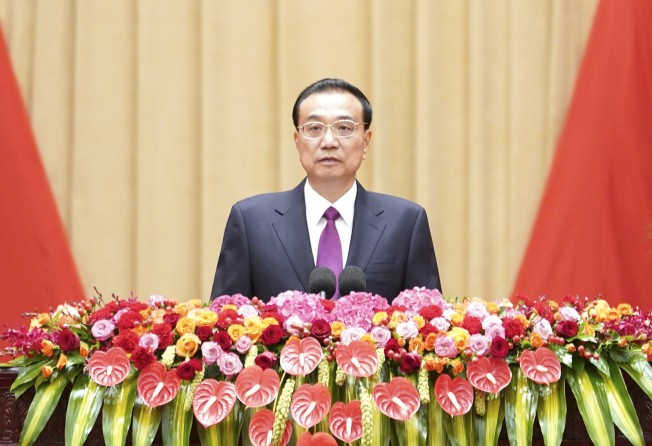China’s risk-averse local cadres at a loss as Beijing repeats economy-boosting plea but offers little
- With the 20th party congress approaching, Premier Li Keqiang’s economy-boosting directives to local authorities ‘will have some effect, but don’t expect too much’, researcher says
- Fears over potential political missteps and abrupt policy changes have resulted in political inertia as local authorities take a wait-and-see approach

Local officials across China – tasked with the precarious and somewhat contradictory mission of driving economic growth against the backdrop of a crippling zero-Covid policy – have become so risk-averse that it is posing a threat to the nation’s economy, according to analysts.
Despite Beijing’s repeated pleas for local-level authorities to help ward off the economic headwinds, there appears to be a degree of political inertia as many local officials are taking a wait-and-see approach in the lead-up to this month’s twice-a-decade party congress.
Uncertainty over how China’s political leadership will shape up under President Xi Jinping has made local cadres apprehensive about costly missteps.
And this apprehension to roll out radical policy changes, even at the behest of Beijing, is hindering local economic recoveries across China, according to a Guangdong-based veteran political researcher who spoke on condition of anonymity.
“All of the businesspeople I know are struggling, with no hope in sight, and the struggle won’t end for at least another six months,” the source said. “Many people will take a wait-and-see approach from the 20th party congress to the ‘two sessions’ next year, as there might be new [policy] adjustments.
“The calls and demands from the premier will have some effect, but don’t expect too much.”
Since May, Premier Li Keqiang has been urging local cadres to put supportive policies in place to lift the economy. He has also dispatched high-ranking officials across the country to ensure that local governments do more to stabilise the economy, after the nation’s gross domestic product (GDP) growth slowed to 0.4 per cent in the second quarter.
He has also called on some of the country’s most developed provinces to shoulder greater responsibilities, while China refrains from introducing massive stimulus measures like it used to combat the impact of the 2008 financial crisis.
His latest call came during Friday’s National Day gala, with Li again imploring local government authorities to take swift action to boost economic growth, and to not sit idly by.
“Our economy is facing many challenges and difficulties. Time waits for no man. We must focus all of our efforts on implementing measures to stabilise the economy. We still have the confidence and ability to keep our economic growth within the accepted range,” Li said.
Local governments are receiving mixed signals from Beijing in the run-up to the 20th party congress, said Tan Yeling, an assistant professor of political science at the University of Oregon and a non-resident senior fellow at the Peterson Institute for International Economics.
“On the one hand, they are asked to actively focus on the economy,” Tan said. “On the other hand, maintaining zero-Covid remains non-negotiable, regardless of cost. And many local governments are under fiscal stress, but real estate development is discouraged because of the need to deleverage.
“These contradictory messages, during a period of political sensitivity, feed into the overall risk-aversion and inaction that is likely to place a drag on China’s economic recovery.”
Alfredo Montufar-Helu, head of the China Centre for Economics and Business at The Conference Board think tank, said: “Authorities have been trying to achieve a very difficult balance between different priorities, which has unfortunately resulted in increasing market uncertainty and weakening confidence from investors and consumers.”
Local-level authorities may also be inclined to take a more conservative approach to avoid making mistakes that could hurt their political futures, he said.
“This effectively means that short-term political priorities have been triumphing over longer-term economic ones,” he said. “And the experience of the two-month full lockdown in Shanghai, and how local authorities have been criticised for this, sends a clear signal that taking the risk of being innovative and proactive is not worth it.”
But once the 20th party congress wraps up, he said, “it is very likely that economic priorities will once again take centre stage”.
Local governments have been stretched thin this year by slashed revenues resulting from the property sector slump; tax rebates they must pay to help pandemic-hit businesses; and other unforeseen expenditures, including the costs of mass testing and enforcing social restrictions.
Revenue fell short of expenditures in all of mainland China’s 31 provinces, municipalities and autonomous regions in the first half of the year.
As measures to boost new home sales are curbed while the central debt policies regarding real estate provide only enough credit support to finish stalled projects, local governments are not left with many options.
Meanwhile, this year’s central government transfer quota to local authorities has almost been used up, as has the quota for special-purpose bonds that are used to fund infrastructure projects, meaning Beijing has little more help to offer.
Local officials cannot drive economic growth like they used to, as they are also hunkering down to fight the pandemic under China’s zero-Covid policy, said Song Zheng, head of the Department of Economics at the Chinese University of Hong Kong.
“In the short term – a few months after the Party Congress – whether local officials return to their main job of promoting their local economies highly depends on whether the zero-Covid policy will continue,” Song said.